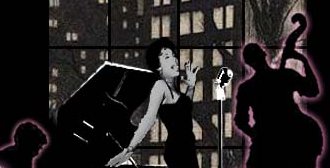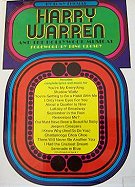Welcome toCafe SongbookInternet Home of the |
 |
 |
| Home || Songs || Songwriters || Performers || Articles and Blogs || Glossary || About Cafe Songbook || Contact/Submit Comment | |
| Search Tips: 1) Click "Find on This Page" button to activate page search box. 2) When searching for a name (e.g. a songwriter), enter last name only. 3) When searching for a song title on the catalog page, omit an initial "The" or "A". 4) more search tips. | |
| Portions of this page have not yet been completed. Thank you for your patience. | |||
Lullaby Of Broadway |
|||
Written: 1934 |
Music by: Harry Warren |
Words by: Al Dubin |
Written for: Gold Diggers of 1935 |
| Page Menu | |||
| Main Stage || Record/Video Cabinet || Reading Room || Posted Comments || Credits | |||
On the Main Stage at Cafe Songbook | |||
(Please complete or pause one video before starting another.) |
Dianne Reevesperforming "Lullaby of Broadway"with Romero Lubambo on guitar
More Performances of "Lullaby of Broadway" |
||
Cafe Songbook Reading Room"Lullaby of Broadway" |
||
| About the Movie Gold Diggers of 1935 / Origins of the Song | ||
|
Gold Diggers of 1935 is a Warner Bros. comedy with music starring Dick Powell, who for the first time in his career gets solo billing. The plot trots out a wealthy heiress with a beautiful daughter who to her mother's horror falls in love with a ritzy resort-hotel desk clerk (Powell) working his way through medical school. The mother visits the posh hotel every summer where she sponsors a show to raise money for charity. The story is filled with comic mishaps as the daughter and the medical student pursue their romance while others bumble their way toward mounting the show, which somehow manages to contain a series of fabulously choreographed and performed numbers -- thanks, of course, to Berkeley. "Lullaby of Broadway" is the finale both the show that the characters in the movie produce (really a film within a film) as well as of the main movie itself, and for most people's money is by far the best and certainly most memorable element of that film, one of the greatest Hollywood dance sequences of all time. (Watch "Lullaby of Broadway," in two parts, just below.) As well as providing a first for Dick Powell, Gold Diggers of 1935 also produced a first for Busby Berkeley (his first time as director of an entire film instead of just the dance numbers) and for Harry Warren and Al Dubin: their first Oscar -- for "Lullaby of Broadway." Watching Gold Diggers of 1935, one can't help but wonder how its creators came up with the story line for the "Lullaby of Broadway number -- "a story told in song, dance and documentary-style film about "a girl who sleeps by day and lives a giddy life at night," framed by a cinematic pastiche depicting life on Broadway. This, however, bears no narrative connection to the story of Gold Diggers of 1935. So what was its origin? This "movie within a movie" is far too elaborate an affair to have been the product of a whim of the moment -- even a Busby Berkeley whim. Did Berkeley have an idea for a production number for which Warren and Dubin were assigned to write a song? Did the song, for some reason, get written first and then generate the idea for the story? Or What? Tony Thomas in Harry Warren and the Hollywood Musical explains it. Warren wrote the entire piece of music with no particular inspiration either from the movie's script or otherwise. He played what he had written for the lyricist and gave him a lead sheet. Dubin took it, went off by himself, and when he had the words called Warren and asked him to come down to his beach house. Then, as Warren told Tony Thomas,
So Here is the inspiration for "Lullaby of Broadway" not dictated by the requirements of a script but by the feelings of the lyricist regarding his co-writer's feelings about New York. Realizing that Dubin's lyric when combined with Warren's music had produced "a great piece of material," Warren played it as soon as he could for Jack Warner, the head of Warner Bros. and for Berkeley. Although Berkeley's response was positive it was not out and out excited. Warner dismissed the lyric telling Warren to have Dubin write a new one. Although it was not generally wise to buck a studio head, Warren "got very brave and replied, 'I'll write you a new song, but I won't divorce this lyric from this melody.'" Warren continued to explain that at that moment he and Dubin were also working on the film Go into Your Dance, starring Al Jolson. As it happened, Warren played the song for [Jolson], and "even before I finished he was hopping around, saying that he had to have it." Not being the shy type, Jolson immediately ran to Jack Warner's office demanding that he be given "Lullaby of Broadway" for his picture. After Warner agreed, Berkeley heard about it and his interest in the song quickly rose from tepid to boiling, at which point he announced to Warner that he had not rejected the song and that it had to be be in his movie, Gold Diggers of 1935. Warner backtracked on his promise to Jolson, gave the song to Berkeley, and the rest, as they say, is history. Tony Thomas concludes by quoting Warren saying that the song might never have been used at all "'if it hadn't been for Jolson's enthusiasm. A lot of negative things can be said about Jolie, but he was an instinctive showman.'" And speaking of instinctive showmen, take a look at what Busby Berkeley did with "Lullaby of Broadway," that "great piece of Material" (See Harry Warren and the Hollywood Musical, pp. 64-68). The Introduction of "Lullaby of Broadway" in Gold Diggers of 1935, directed by Busby Berkeley
|
|
| back to top of page | ||
| Critics Corner | ||
| (This section is currently in preparation.) | ||
| back to top of page | ||
| Lyrics Lounge | ||
(This section is currently in preparation.) Click here to read Cafe Songbook lyrics policy. |
||
| back to top of page | ||
Visitor CommentsSubmit comments on songs, songwriters, performers, etc.
Feel free to suggest an addition or correction. Please read our Comments Guidelines before making a submission. (Posting of comments is subject to the guidelines. Not all comments will be posted.) |
| To submit a comment, click here. |
Posted Comments on "Lullaby of Broadway":
No Comments as yet posted |
| back to top of page |
Credits("Lullaby of Broadway" page) |
Credits for Videomakers of custom videos used on this page:
Borrowed material (text): The sources of all quoted and paraphrased text are cited. Such content is used under the rules of fair use to further the educational objectives of CafeSongbook.com. CafeSongbook.com makes no claims to rights of any kind in this content or the sources from which it comes.
Borrowed material (images): Images of CD, DVD, book and similar product covers are used courtesy of either Amazon.com
Any other images that appear on CafeSongbook.com pages are either in the public domain or appear through the specific permission of their owners. Such permission will be acknowledged in this space on the page where the image is used.
For further information on Cafe Songbook policies with regard to the above matters, see our "About Cafe Songbook" page (link at top and bottom of every page). |
This section is currently incomplete. The Cafe Songbook |
||
|
Performer/Recording Index
(*indicates accompanying music-video)
|
||
Year Music-Video
Notes: |
||
| back to top of page | ||
Year Music-Video
Notes: |
||
| back to top of page | ||
Year Music-Video
Notes: |
||
| back to top of page | ||
Year
Music-Video: Notes: |
||
| back to top of page | ||
Year Music-Video
Notes: |
||
| back to top of page | ||
Year Music-Video
Notes: |
||
| back to top of page | ||
Year Music-Video
Notes: |
||
| back to top of page | ||
Year Music-Video
Notes: |
||
| back to top of page |
| Home || Songs || Songwriters || Performers || Articles and Blogs || Glossary || About Cafe Songbook || Contact/Submit Comment | |
© 2009-2018 by CafeSongbook.com -- All Rights Reserved |


